Fortunately we had not planned to hike up Etna (it’s far too
snowy and we are not interested in snowshoeing, plus it’s up in the overcast
somewhere anyway and, as it turns out, it is about to erupt but we did not know
that at the time), because Phyllis’ foot was very stiff and sore today. It was perfectly fine for changing car gears
though, so we drove around the
west side of Etna and into better weather, at
least for a time. But first, we had a
great farmhouse breakfast at the agriturismo.
Freshly baked pastries and cake, fruit, fresh squeezed blood orange
juice, coffee (Americano for Phyllis), home made yoghurt. Interestingly, no eggs despite there being
chickens in the barnyard; this has been the case throughout Sicily so far, with
only the occasional hard boiled egg offered.
Francesco’s mother is the cook, and she came out of the kitchen to ask (in
Italian, of course) how the injured foot was doing.
Later, as we were admiring the old
photographs on the wall of the dining room, she indicated that these were the
current buildings in their original state, before they restored
them. Francesco had already told us that they
started the agriturismo business in about 2001 after fixing things up, but we
had no idea how run down it had originally been. The buildings were originally built in 1865
so they were entitled to look a little old.
We had seen many ramshackle stone buildings throughout our drives, and
this place had been exactly like that.
What a lot of work they put into it.
While winter is a slow time, summer is apparently quite busy thanks to a
couple of contracts with foreign tour companies, and we were glad to learn that
they are doing so well. However, Phyllis
asked Francesco if he could cook, and when he said no, only his
mother, we
wondered what will happen when she passes away.
What a shame it would be for this place to be lost to tourism…
After breakfast, our drive was through small cities that
were not particularly scenic, but the mountain gradually emerged from its veil
and provided a nice view. Rather
shocking was the amount of garbage by the side of the road in this area, which
we’d not seen before. And not just the
occasional piece of trash, but on turnouts along the road there were huge piles
of trash bags, many broken or torn open.
Plus assorted mattresses and other large junk. We
were shocked, and wondered if this
indicated that areas between towns did not have local garbage service. Later however we saw the same situation within
towns, so we still do not know what to make of this.
Back on a highway after winding our way around Etna, and after
seeing numerous billboards for something called “Etnapolis, Scily’s Largest
Shopping Mall”, we could not resist checking this out. After a couple of wrong turns we found the
main entrance and browsed the shops and had a late lunch in the food
court. We resisted McDonalds (which is
very
pricey here) and settled for pizza.
On the road again, we arrived in Siracusa in late afternoon. Ortygia, the old part of town, where we were
staying, is an island attached to the mainland by a couple of
bridge/causeways. We stashed the car in
a municipal parking lot just over the bridge (otherwise, it would require
negotiating another old town center full of narrow cobblestone streets and
limited parking) and walked down to our B&B on the far end of the
island. It was just a 20-minute walk,
but it was windy and threatening to rain again.
After meeting our host and talking politics for awhile, both Italian and
American (yes, he asked about Sarah Palin and was pleased to see our facial
expressions in reaction), we headed out for a walk
around the old town before
it got dark.
Siracusa has a beautiful old cathedral (duomo) fronting onto
a large piazza, and an evening service was just ending when we walked by so we
went in to see the interior. Like so
many other major structures in Sicily, it was built on top of an ancient Greek
temple, this one of Athena. In fact, you
can see parts of the old temple columns incorporated into the duomo walls. Several baroque palaces, most now used for
governmental functions like “city hall”,
surround the entire Piazza Duomo. From here we walked on around the waterfront
promenade, to the Fountain of Arethusa (originally a spring-fed pool, now enclosed
by stonework with a papyrus-filled reservoir in the bottom). We saw lots of rather large fish just outside
the seawall but only one fisherman with no catch thus far. On our rounds, we scouted for a light dinner
spot, having eaten far too much food in the last 24 hours. A small beer and bruschetta for Phyllis,
larger beer and hamburger (of all things) for Craig, and our day was done.

 Syracuse, Sicily, Italy
Syracuse, Sicily, Italy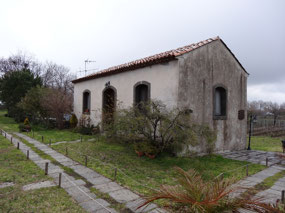
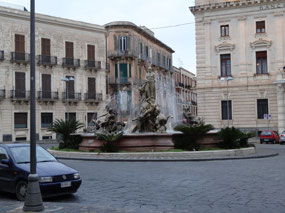
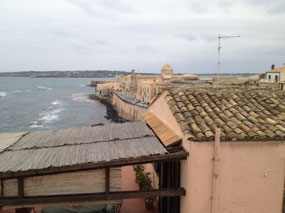
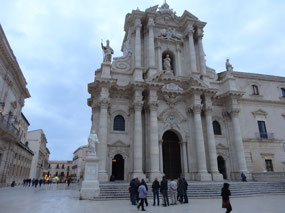
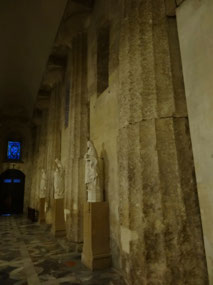
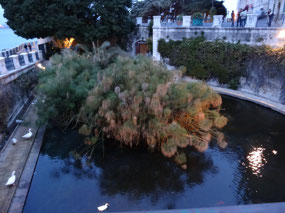
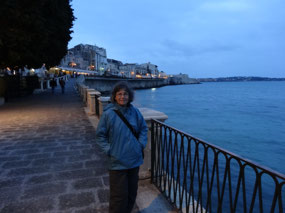




2025-05-23